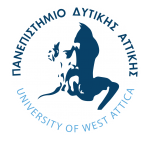Course info:
Semester: 1
General Foundation
ECTS: 6
Hours per week: 3
Professor: T.B.D.
Teaching style: Classroom lectures and tutorials
Grading: 100% final exam
| Activity | Workload |
|---|---|
| Lectures | 36 |
| Non-guided study | 114 |
| Course total | 150 |
Learning Results
After the successful completion of this course, students will have become acquainted with ideas and techniques from discrete mathematics that are widely used in data science and artificial intelligence. They will be able to 1) understand and work with the abstract mathematical structures used to represent discrete objects and relationships between these objects, 2) understand the mathematical reasoning needed to construct and consequently prove arguments, 3) gain the deeper mathematical insight needed in the courses that use certain applications of Discrete Mathematics.
Skills acquired
Research, analysis and synthesis of the data and information, using the appropriate equipment, Working into an interdisciplinary environment, Producing new research ideas, Promotion of free, creative and inductive thinking.
- Propositional Logic
- Predicates and Quantifiers
- Sets, Relations and Functions
- Equivalence Relations and Partitions
- Countable and Uncountable Sets
- Mathematical Induction
- Discrete Numeric Functions
- Recursive Relations
- Introduction to Combinatorics
- The Principle of Inclusion-Exclusion
- Introduction to Graph Theory (graph representation, Euler and Hamiltonian paths, connectivity, shortest paths, planar graphs and trees)
- Susanna S. Epp, “Discrete Mathematics with Applications”, 5th edition, Cengage Learning, Inc, 2019, ISBN: 978-1337694193.
- Kenneth Rosen, “Discrete Mathematics and its Applications”, 8th edition, Mc Graw Hill, 2018, ISBN: 978-1260091991
- Judith L. Gersting, “Mathematical Structures for Computer Science”, 7th edition, W. H. Freeman, 2014, ISBN: 978-1429215107
- Kevin Ferland, “Discrete Mathematics: An introduction to proofs and combinatorics”, 1st edition, Brooks Cole, 2008, ISBN: 978-0-618-41538-0
- Chung Laung Liu, “Elements of Discrete Mathematics”, 2nd edition, Mc Graw Hill, 1985, ISBN: 0-07-038133-X
- Tom Jenkyns, Ben Stephenson, “Fundamentals of Discrete Math for Computer Science”, 2nd edition, Springer, 2018, ISBN: ISBN 978-3-319-70150-9
- Learning Results - Skills acquired
-
Learning Results
After the successful completion of this course, students will have become acquainted with ideas and techniques from discrete mathematics that are widely used in data science and artificial intelligence. They will be able to 1) understand and work with the abstract mathematical structures used to represent discrete objects and relationships between these objects, 2) understand the mathematical reasoning needed to construct and consequently prove arguments, 3) gain the deeper mathematical insight needed in the courses that use certain applications of Discrete Mathematics.
Skills acquired
Research, analysis and synthesis of the data and information, using the appropriate equipment, Working into an interdisciplinary environment, Producing new research ideas, Promotion of free, creative and inductive thinking.
- Course content
-
- Propositional Logic
- Predicates and Quantifiers
- Sets, Relations and Functions
- Equivalence Relations and Partitions
- Countable and Uncountable Sets
- Mathematical Induction
- Discrete Numeric Functions
- Recursive Relations
- Introduction to Combinatorics
- The Principle of Inclusion-Exclusion
- Introduction to Graph Theory (graph representation, Euler and Hamiltonian paths, connectivity, shortest paths, planar graphs and trees)
- Recommended bibliography
-
- Susanna S. Epp, “Discrete Mathematics with Applications”, 5th edition, Cengage Learning, Inc, 2019, ISBN: 978-1337694193.
- Kenneth Rosen, “Discrete Mathematics and its Applications”, 8th edition, Mc Graw Hill, 2018, ISBN: 978-1260091991
- Judith L. Gersting, “Mathematical Structures for Computer Science”, 7th edition, W. H. Freeman, 2014, ISBN: 978-1429215107
- Kevin Ferland, “Discrete Mathematics: An introduction to proofs and combinatorics”, 1st edition, Brooks Cole, 2008, ISBN: 978-0-618-41538-0
- Chung Laung Liu, “Elements of Discrete Mathematics”, 2nd edition, Mc Graw Hill, 1985, ISBN: 0-07-038133-X
- Tom Jenkyns, Ben Stephenson, “Fundamentals of Discrete Math for Computer Science”, 2nd edition, Springer, 2018, ISBN: ISBN 978-3-319-70150-9
